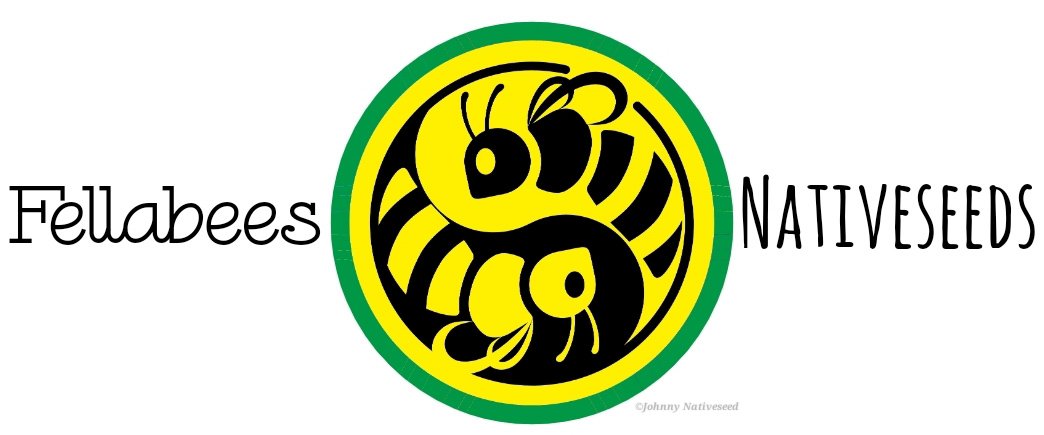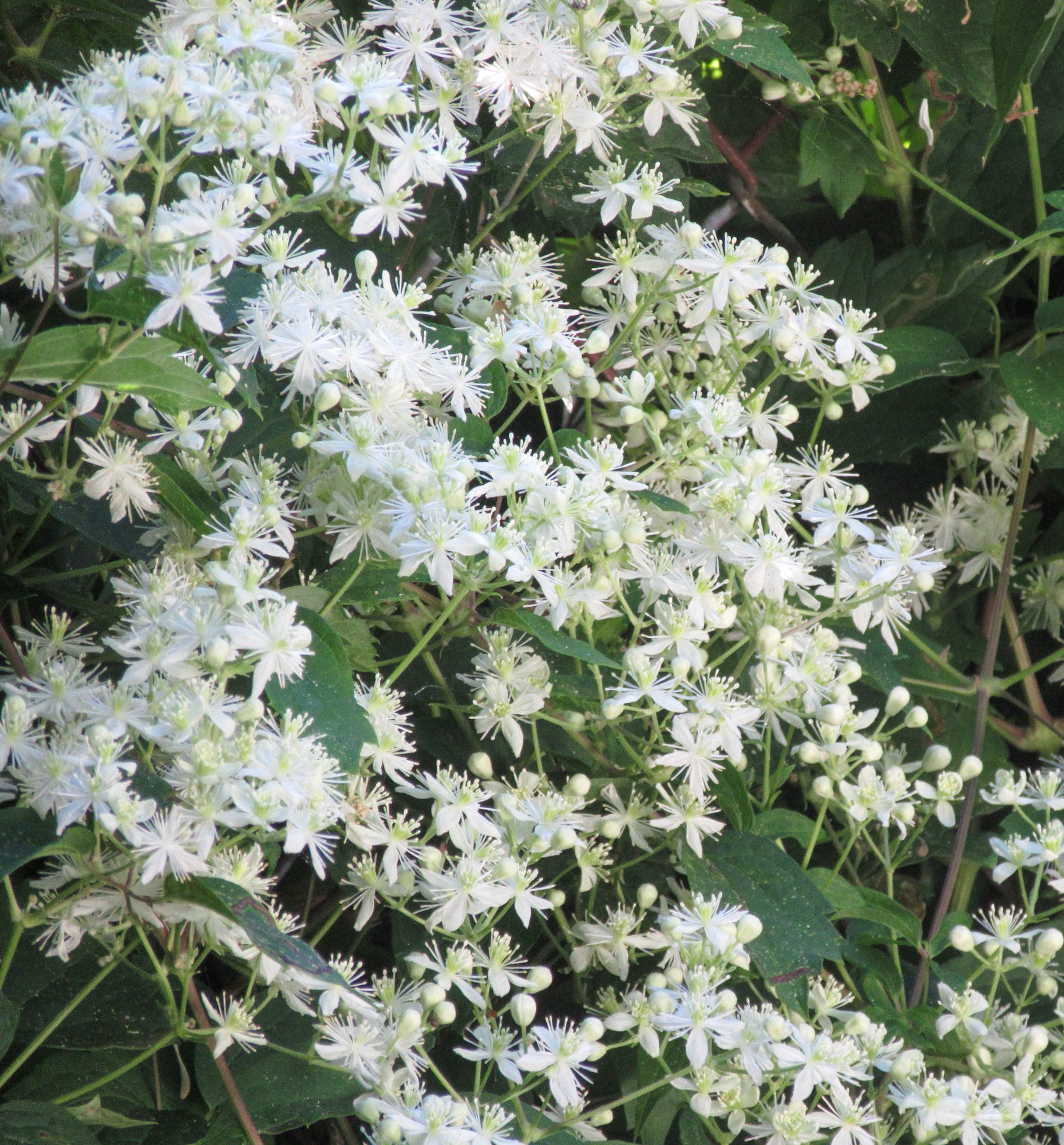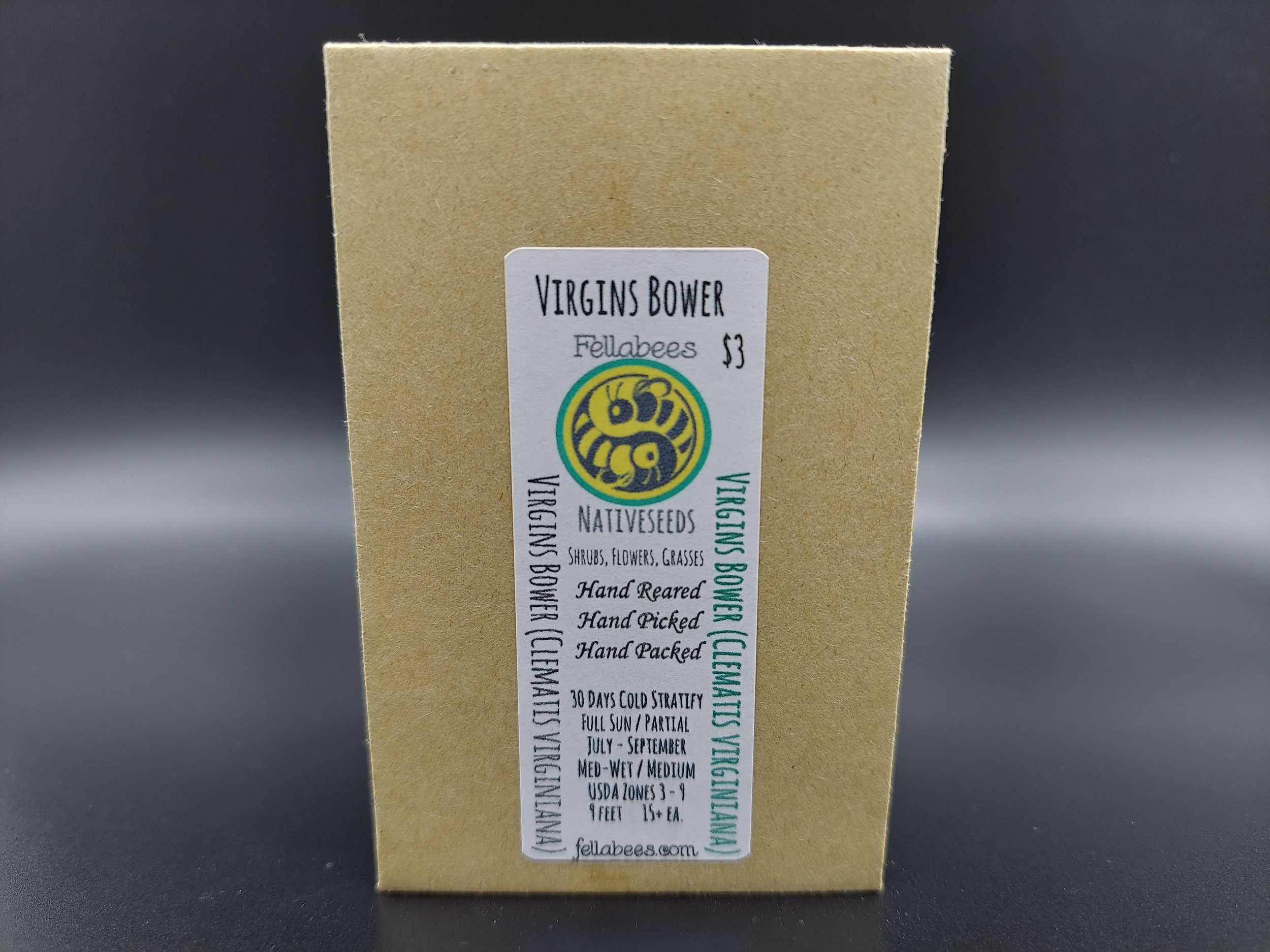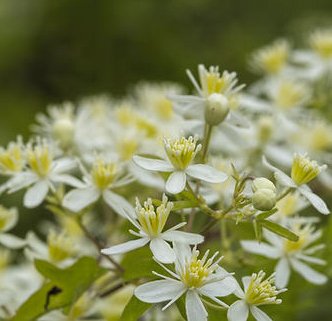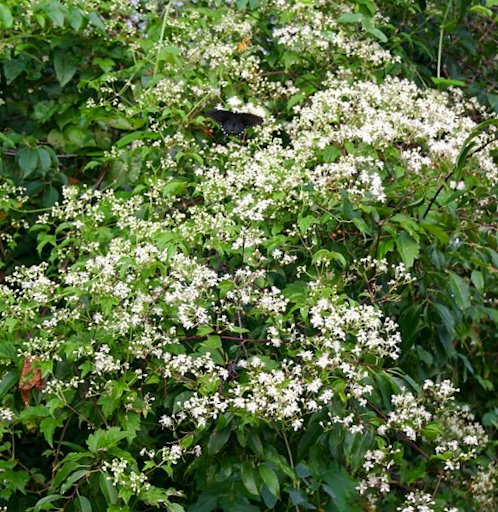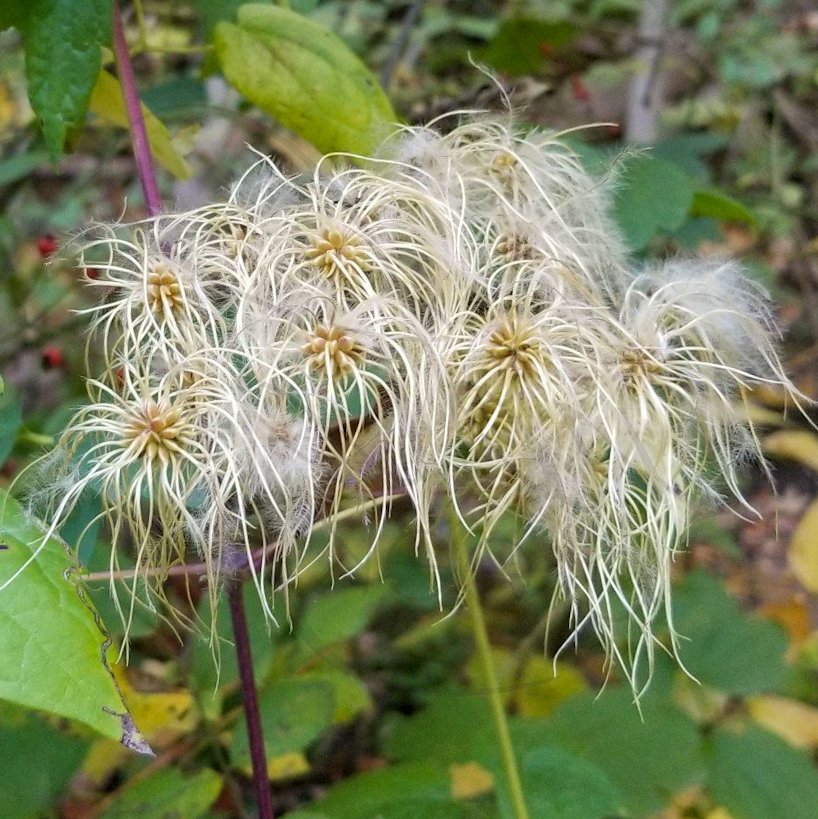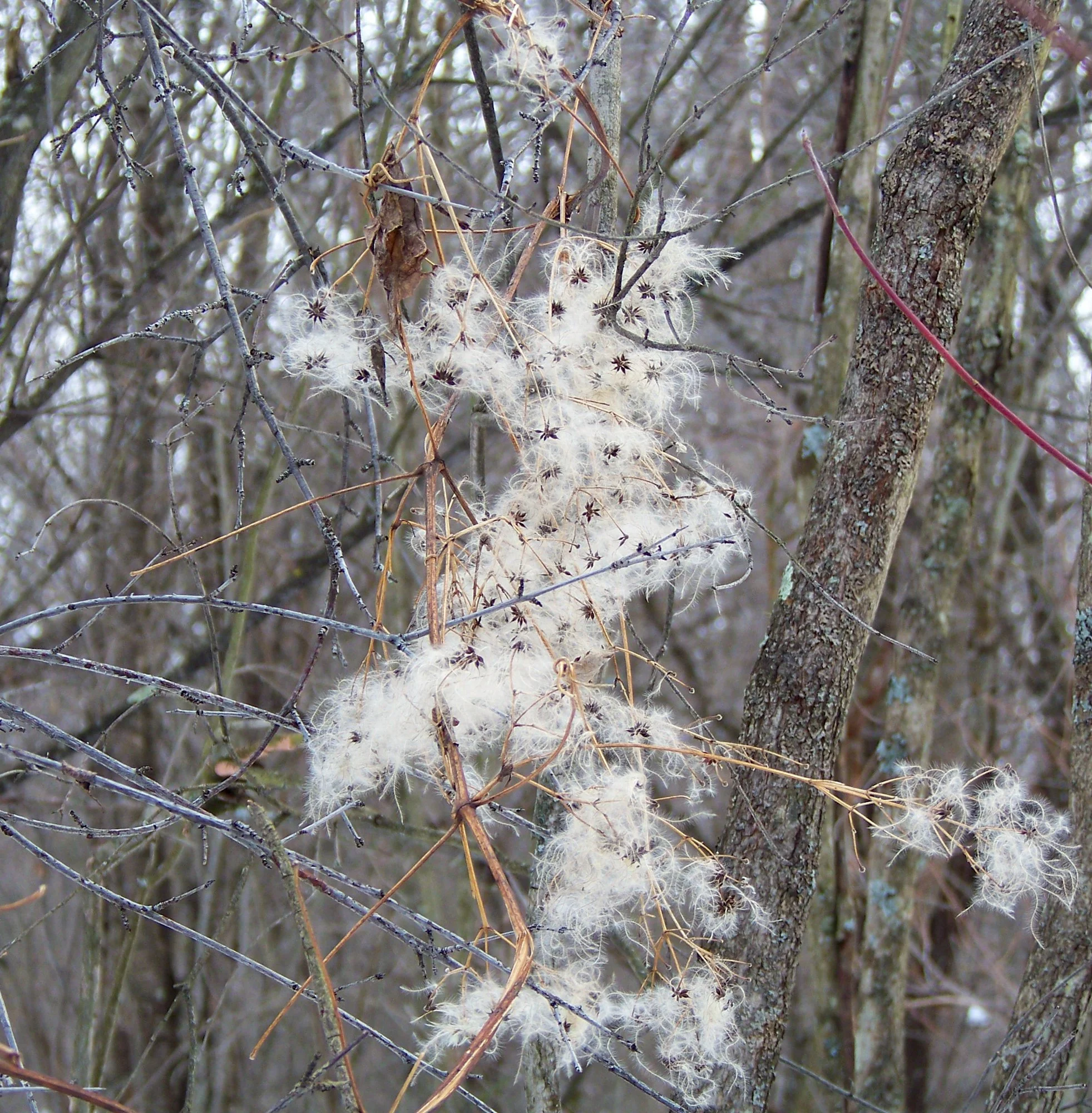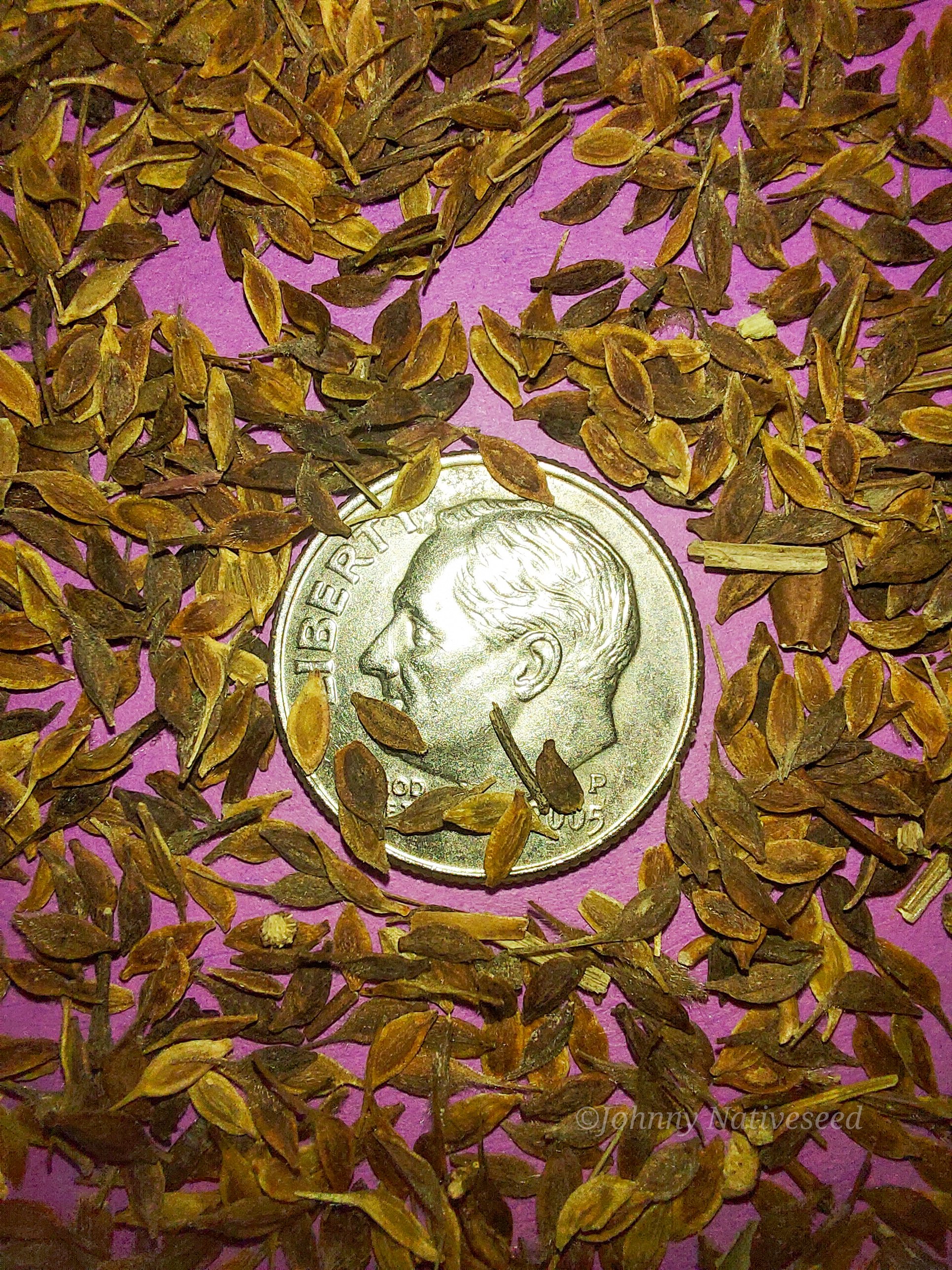Virgins Bower (Clematis virginiana)
Virgins Bower (Clematis virginiana)
Virgins Bower is our regional common name for this vine scientificly named Clematis virginiana.
Interestingly, this plant also gets called Smoke On A Rope, Devil's Darning Needles, Devil's Hair, Love Vine, Traveller's Joy, Virginia Virgin's Bower, Wild Hops, and even Woodbine.
Virgins Bower is a native vine of the Ranunculaceae (buttercup) family endemic to North America from Newfoundland to southern Manitoba down to the Gulf of Mexico.
The rationale for some of the common names is unclear, as they include examples normally applied to unrelated plants, including twining parasites (e.g. "Devil's Hair" for Cuscuta). The name "Love Vine" also is applied to alleged aphrodisiacs, such as Caribbean species of Cassytha, which are unrelated to Clematis, not being in the Ranunculaceae family.
This plant is a vine which can climb to heights of 10–20 feet by twisting leafstalks. The leaves are opposite and pinnately compound, trifoliate (3 leaflets) that have coarse unequal teeth on the margins. It produces dainty looking white flowers of 1⁄2 to 3⁄4 inch in width blooming from July to September that are faintly sweetly fragrant.
Sometimes dioecious so that there are separate staminate (male) and pistillate (female) plants. The male plants are a little showier in flower and don't bear seed. The dry fruit is an achene with long hair as silvery gray feathery plumes attached in late August into November.
Virgins Bower grows on the edges of the woods, moist slopes, fence rows, in thickets and on streambanks. It grows in full sun to light full shade and is extremely adaptable to many soils from sandy to clay, dry to draining wet, and acid to alkaline with a pH range of 6.0 to 8.5. It posseses a deep but sparse, fibrous root system that makes it eceedingly hard to transplant.
This plant is considered present but rare in several counties of the states of Kansas, Oklahoma, and Texas.
Virgins Bower is a larval host of the Clematis Clearwing Moth (Alcathoe caudata).
Plant Details
USDA Zones: 3-9
Germination Needs: 30 Day Cold Stratification, Seed performs best, if direct sown outdoors in Fall.
Life Cycle: Perennial
Sun Exposure: Full to Partial
Soil Moisture: Medium-Wet, Medium
Plant Spacing: 3-4 feet
Height: 9+ feet
Bloom time: July, August, September
Bloom Color: White
Advantages :
Pollinator Favorite: butterflies, moths, bees, wasps, beetles
Bird Favorite: seeds, insects, fruit, nectar, nesting, perchs.
Deer Resistant: Yes
Native to : Wisconsin, Minnesota, Iowa, Illinois, Indiana, Michigan, Ohio, Pennsylvania, New York, Vermont, New Hampshire, Maine, Massachusetts, Rhode Island, Connecticut, Delaware, Maryland, New Jersey, West Virginia, Virginia, Kentucky, Tennessee, North Carolina, South Carolina, Georgia, Alabama, Mississippi, Louisiana, Florida, Arkansas, Missouri, Texas, Oklahoma, Kansas, Nebraska, South Dakota, and North Dakota.
.
.
Packet quantities:
We pride ourselves on ethical, hands on, ecological management, using no mechanical or chemical methods whatsoever.
All of our native seed is hand reared, hand picked, and hand packed from native prairies under our exclusive management, never breaking chain of custody from the field until it is sent to you. Each packet is hand prepared for shipment by us, directly.
Small seed species will contain greater than 20-25 seed
Large seed species will contain greater than 10-15 seed
It is our mission to spread the wealth of native plant and pollinator ecological sustainability, and educate back yard gardeners as well as corporate and government entities in how to germinate, grow, and benefit from native synergies.
Thank you for your support, it is because of you, that we can grow together to do, what we do.🐛🦋🐝🐞🌾🌱🌼🧡
Virgins Bower (Clematis virginiana)
Virgins Bower is our regional common name for this vine scientificly named Clematis virginiana.
Interestingly, this plant also gets called Smoke On A Rope, Devil's Darning Needles, Devil's Hair, Love Vine, Traveller's Joy, Virginia Virgin's Bower, Wild Hops, and even Woodbine.
Virgins Bower is a native vine of the Ranunculaceae (buttercup) family endemic to North America from Newfoundland to southern Manitoba down to the Gulf of Mexico.
The rationale for some of the common names is unclear, as they include examples normally applied to unrelated plants, including twining parasites (e.g. "Devil's Hair" for Cuscuta). The name "Love Vine" also is applied to alleged aphrodisiacs, such as Caribbean species of Cassytha, which are unrelated to Clematis, not being in the Ranunculaceae family.
This plant is a vine which can climb to heights of 10–20 feet by twisting leafstalks. The leaves are opposite and pinnately compound, trifoliate (3 leaflets) that have coarse unequal teeth on the margins. It produces dainty looking white flowers of 1⁄2 to 3⁄4 inch in width blooming from July to September that are faintly sweetly fragrant.
Sometimes dioecious so that there are separate staminate (male) and pistillate (female) plants. The male plants are a little showier in flower and don't bear seed. The dry fruit is an achene with long hair as silvery gray feathery plumes attached in late August into November.
Virgins Bower grows on the edges of the woods, moist slopes, fence rows, in thickets and on streambanks. It grows in full sun to light full shade and is extremely adaptable to many soils from sandy to clay, dry to draining wet, and acid to alkaline with a pH range of 6.0 to 8.5. It posseses a deep but sparse, fibrous root system that makes it eceedingly hard to transplant.
This plant is considered present but rare in several counties of the states of Kansas, Oklahoma, and Texas.
Virgins Bower is a larval host of the Clematis Clearwing Moth (Alcathoe caudata).
Plant Details
USDA Zones: 3-9
Germination Needs: 30 Day Cold Stratification, Seed performs best, if direct sown outdoors in Fall.
Life Cycle: Perennial
Sun Exposure: Full to Partial
Soil Moisture: Medium-Wet, Medium
Plant Spacing: 3-4 feet
Height: 9+ feet
Bloom time: July, August, September
Bloom Color: White
Advantages :
Pollinator Favorite: butterflies, moths, bees, wasps, beetles
Bird Favorite: seeds, insects, fruit, nectar, nesting, perchs.
Deer Resistant: Yes
Native to : Wisconsin, Minnesota, Iowa, Illinois, Indiana, Michigan, Ohio, Pennsylvania, New York, Vermont, New Hampshire, Maine, Massachusetts, Rhode Island, Connecticut, Delaware, Maryland, New Jersey, West Virginia, Virginia, Kentucky, Tennessee, North Carolina, South Carolina, Georgia, Alabama, Mississippi, Louisiana, Florida, Arkansas, Missouri, Texas, Oklahoma, Kansas, Nebraska, South Dakota, and North Dakota.
.
.
Packet quantities:
We pride ourselves on ethical, hands on, ecological management, using no mechanical or chemical methods whatsoever.
All of our native seed is hand reared, hand picked, and hand packed from native prairies under our exclusive management, never breaking chain of custody from the field until it is sent to you. Each packet is hand prepared for shipment by us, directly.
Small seed species will contain greater than 20-25 seed
Large seed species will contain greater than 10-15 seed
It is our mission to spread the wealth of native plant and pollinator ecological sustainability, and educate back yard gardeners as well as corporate and government entities in how to germinate, grow, and benefit from native synergies.
Thank you for your support, it is because of you, that we can grow together to do, what we do.🐛🦋🐝🐞🌾🌱🌼🧡
Virgins Bower (Clematis virginiana)
Virgins Bower is our regional common name for this vine scientificly named Clematis virginiana.
Interestingly, this plant also gets called Smoke On A Rope, Devil's Darning Needles, Devil's Hair, Love Vine, Traveller's Joy, Virginia Virgin's Bower, Wild Hops, and even Woodbine.
Virgins Bower is a native vine of the Ranunculaceae (buttercup) family endemic to North America from Newfoundland to southern Manitoba down to the Gulf of Mexico.
The rationale for some of the common names is unclear, as they include examples normally applied to unrelated plants, including twining parasites (e.g. "Devil's Hair" for Cuscuta). The name "Love Vine" also is applied to alleged aphrodisiacs, such as Caribbean species of Cassytha, which are unrelated to Clematis, not being in the Ranunculaceae family.
This plant is a vine which can climb to heights of 10–20 feet by twisting leafstalks. The leaves are opposite and pinnately compound, trifoliate (3 leaflets) that have coarse unequal teeth on the margins. It produces dainty looking white flowers of 1⁄2 to 3⁄4 inch in width blooming from July to September that are faintly sweetly fragrant.
Sometimes dioecious so that there are separate staminate (male) and pistillate (female) plants. The male plants are a little showier in flower and don't bear seed. The dry fruit is an achene with long hair as silvery gray feathery plumes attached in late August into November.
Virgins Bower grows on the edges of the woods, moist slopes, fence rows, in thickets and on streambanks. It grows in full sun to light full shade and is extremely adaptable to many soils from sandy to clay, dry to draining wet, and acid to alkaline with a pH range of 6.0 to 8.5. It posseses a deep but sparse, fibrous root system that makes it eceedingly hard to transplant.
This plant is considered present but rare in several counties of the states of Kansas, Oklahoma, and Texas.
Virgins Bower is a larval host of the Clematis Clearwing Moth (Alcathoe caudata).
Plant Details
USDA Zones: 3-9
Germination Needs: 30 Day Cold Stratification, Seed performs best, if direct sown outdoors in Fall.
Life Cycle: Perennial
Sun Exposure: Full to Partial
Soil Moisture: Medium-Wet, Medium
Plant Spacing: 3-4 feet
Height: 9+ feet
Bloom time: July, August, September
Bloom Color: White
Advantages :
Pollinator Favorite: butterflies, moths, bees, wasps, beetles
Bird Favorite: seeds, insects, fruit, nectar, nesting, perchs.
Deer Resistant: Yes
Native to : Wisconsin, Minnesota, Iowa, Illinois, Indiana, Michigan, Ohio, Pennsylvania, New York, Vermont, New Hampshire, Maine, Massachusetts, Rhode Island, Connecticut, Delaware, Maryland, New Jersey, West Virginia, Virginia, Kentucky, Tennessee, North Carolina, South Carolina, Georgia, Alabama, Mississippi, Louisiana, Florida, Arkansas, Missouri, Texas, Oklahoma, Kansas, Nebraska, South Dakota, and North Dakota.
.
.
Packet quantities:
We pride ourselves on ethical, hands on, ecological management, using no mechanical or chemical methods whatsoever.
All of our native seed is hand reared, hand picked, and hand packed from native prairies under our exclusive management, never breaking chain of custody from the field until it is sent to you. Each packet is hand prepared for shipment by us, directly.
Small seed species will contain greater than 20-25 seed
Large seed species will contain greater than 10-15 seed
It is our mission to spread the wealth of native plant and pollinator ecological sustainability, and educate back yard gardeners as well as corporate and government entities in how to germinate, grow, and benefit from native synergies.
Thank you for your support, it is because of you, that we can grow together to do, what we do.🐛🦋🐝🐞🌾🌱🌼🧡
